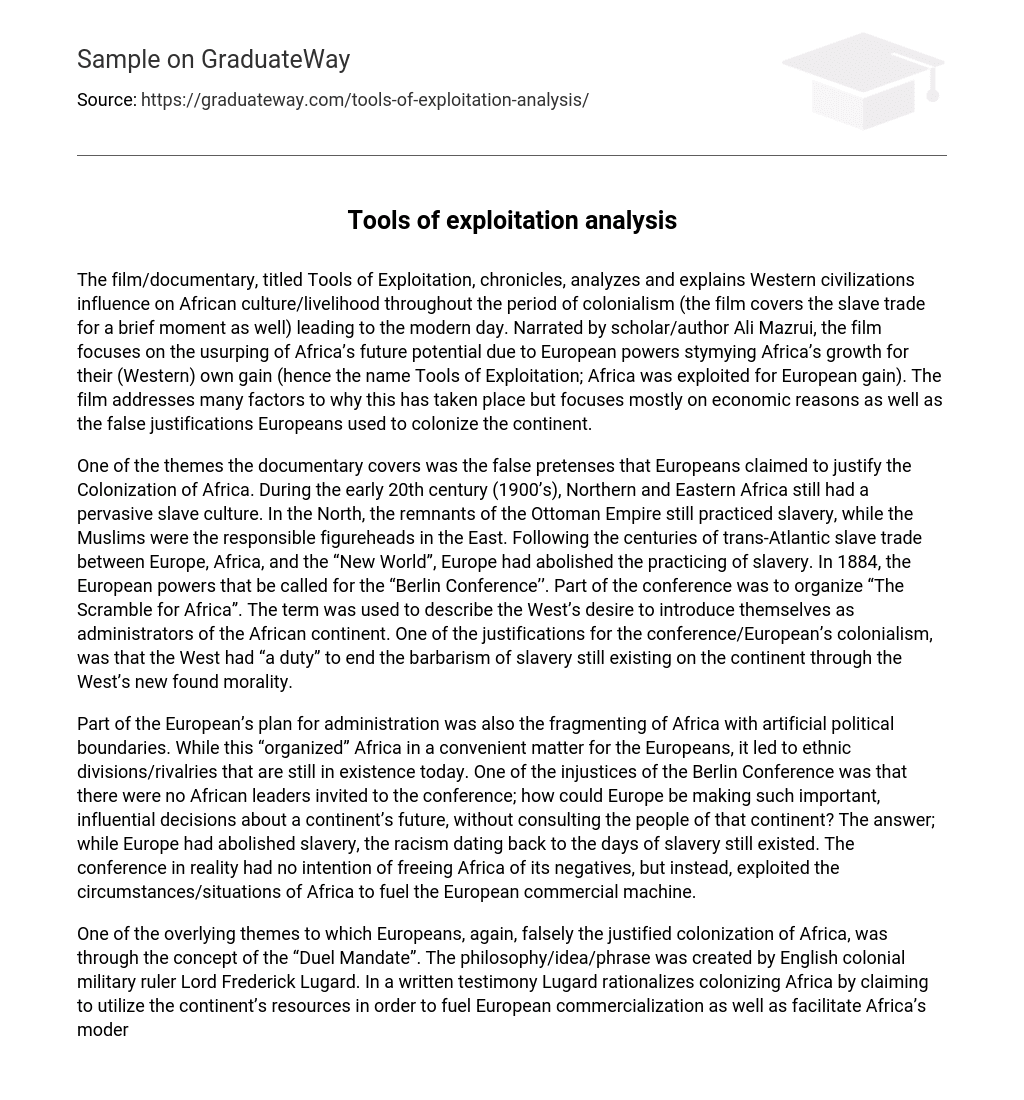The film/documentary, titled Tools of Exploitation, chronicles, analyzes and explains Western civilizations influence on African culture/livelihood throughout the period of colonialism (the film covers the slave trade for a brief moment as well) leading to the modern day. Narrated by scholar/author Ali Mazrui, the film focuses on the usurping of Africa’s future potential due to European powers stymying Africa’s growth for their (Western) own gain (hence the name Tools of Exploitation; Africa was exploited for European gain). The film addresses many factors to why this has taken place but focuses mostly on economic reasons as well as the false justifications Europeans used to colonize the continent.
One of the themes the documentary covers was the false pretenses that Europeans claimed to justify the Colonization of Africa. During the early 20th century (1900’s), Northern and Eastern Africa still had a pervasive slave culture. In the North, the remnants of the Ottoman Empire still practiced slavery, while the Muslims were the responsible figureheads in the East. Following the centuries of trans-Atlantic slave trade between Europe, Africa, and the “New World”, Europe had abolished the practicing of slavery. In 1884, the European powers that be called for the “Berlin Conference’’. Part of the conference was to organize “The Scramble for Africa”. The term was used to describe the West’s desire to introduce themselves as administrators of the African continent. One of the justifications for the conference/European’s colonialism, was that the West had “a duty” to end the barbarism of slavery still existing on the continent through the West’s new found morality.
Part of the European’s plan for administration was also the fragmenting of Africa with artificial political boundaries. While this “organized” Africa in a convenient matter for the Europeans, it led to ethnic divisions/rivalries that are still in existence today. One of the injustices of the Berlin Conference was that there were no African leaders invited to the conference; how could Europe be making such important, influential decisions about a continent’s future, without consulting the people of that continent? The answer; while Europe had abolished slavery, the racism dating back to the days of slavery still existed. The conference in reality had no intention of freeing Africa of its negatives, but instead, exploited the circumstances/situations of Africa to fuel the European commercial machine.
One of the overlying themes to which Europeans, again, falsely the justified colonization of Africa, was through the concept of the “Duel Mandate”. The philosophy/idea/phrase was created by English colonial military ruler Lord Frederick Lugard. In a written testimony Lugard rationalizes colonizing Africa by claiming to utilize the continent’s resources in order to fuel European commercialization as well as facilitate Africa’s modernization. The first half of the equation did come to fruition; Europe conveniently gained access to African’s resources (first pre-colonialism through slaves and gold, then later with mineral based resources during colonization). However, European’s modernization of Africa was merely surface level. Africa was given infrastructure (roads), skyscrape-esque buildings, commercial items (clothes, recreational technologies); but the African continent was not given the means for long term industrialization to keep up with the global economy. What does Africa benefit from having Western fashion? Africa has large-scale downtowns, and business sectors, but what is the purpose when these buildings/businesses are powered by faulty electricity?
The vessels of modernization were left by Europeans, but there was no functionality or means of using the vessels for modernization. While the West was industrializing, Africa was being fed a message of false growth. Africa never had a chance to develop a means of self-creation/production in the 20th century. A perfect example of this was cited in the film. The West African country of Liberia is a large exporter of the raw material for rubber, which is a major commercial commodity in the global economy. However, Liberia itself does not have the means to convert the raw materials into the final product, meaning the country has to import (purchase) finished rubber from outside countries. Was not part of the White Man’s burden and part of the Dual Mandate, to uplift Africa through use of its own resources? How is it that one of the richest continents with regards to natural resources could not take the next step towards mechanization/commercialization with the aid of the West? Again, the emphatic answer is that the West had no intention of aiding the continent in the first place.
The economic shackles of colonialism were a pre-meditated, calculated attack on the development of Africa during the turn into the twentieth century. The lasting outcome has left Africa crippled even now in modern times. With slavery, Africa already became under populated destroying a large potential for human development/advancement; colonialism than hampered any immediate potential for industrial advancement in the continent. Now, modern day Africa’s urban areas/capitals have the appearance of advanced societies but are barely functional/beneficial as useful tools for everyday use (as Mazrui says, the buildings’ functions are “quenched”). What is even more disturbing is the similar behaviors exhibited by Asian countries (specifically) China in modern day Africa through a sort of “neo-colonialism”. Various reports detail foreign Asian workers entering African countries to build infrastructure (roads, pipelines, hospitals, etc.). In actuality, these foreign influences are building conduits to ship materials back to their own coutnry. Tools of Exploitation not only chronicled the economic handicaps and lies that fueled colonialism in 1900’s; the film also describes a similar blueprint that modern emerging powers are beginning to employ as well





